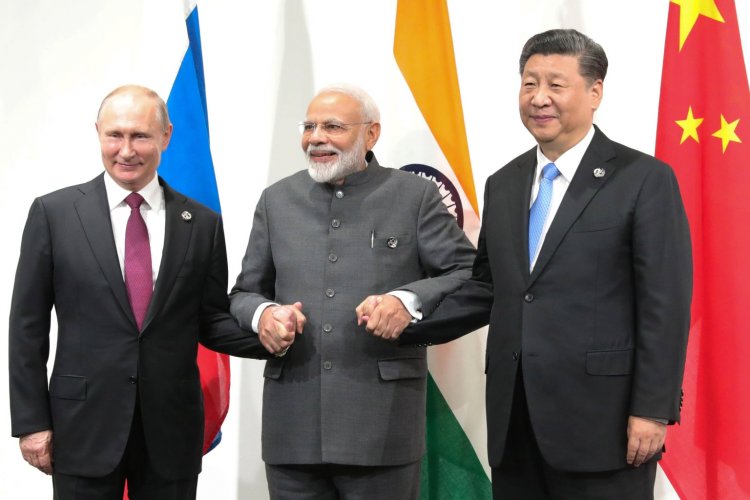SINO-Russian Alliance Compelling India to Recalibrate
STORIES, ANALYSES, EXPERT VIEWS

Last February, Vladimir Putin travelled to Beijing to unveil a partnership ‘without limits' and with no ‘forbidden areas’. The Beijing declaration laid out a solid basis for jointly confronting the West.
This Sino-Russian alliance along with the Russian aggression towards Ukraine, and the deepening confrontation between the West and Russia and China, in the view of C Raja Mohan (senior fellow, Asia Society Policy Institute, and contributing editor on international affairs for The Indian Express) “are compelling India to recalibrate its international relations.”
It is not unreasonable to presume, writes Mohan “that the Sino-Russian alliance added to Moscow’s confidence in risking a confrontation with the West in Europe……A quick, decisive and successful use of force in Ukraine would have deeply divided Europe and fractured the US-led trans-Atlantic security system that dominated the region for more than seven decades. Coming less than a year after the ignominious US withdrawal from Afghanistan, Moscow’s absorption of Ukraine would have further undermined the credibility of the US as a global power.
“Putin’s victory in Europe would have had a dramatic impact on Asia too. It would have reinforced the sentiment that America is in terminal decline, weakened US alliances in Asia, and boosted China’s ambition to radically reshape its periphery. If Putin had successfully conquered Ukraine, Xi’s path to unification with Taiwan through the use of force or mere coercive diplomacy might have eased."
Future of the Sino-Russia alliance and the implications for India
But the Sino-Russian project of building a post-Western global order went wrong in Ukraine. Mohan discusses the future of the Sino-Russia alliance and the implications for India. He makes several preliminary assessments.
First, the has “facilitated the resurrection of Western unity under American leadership.…..The Russian invasion has also triggered the fear of Chinese territorial expansionism in Asia. This has led to the strengthening of US bilateral alliances with Australia and Japan….
“Second, the Sino-Russian alliance and the Ukraine war have seen two reluctant and pacifist powers — Germany and Japan — join the battle against Moscow and Beijing….”
Third, the US has brought “its alliances and partnerships in Europe and Asia closer. We saw the leaders of America’s Asian allies join for the first time a NATO summit last June in Madrid. NATO, in turn, has promised to take a greater interest in shaping the Indo-Pacific balance of power.
“Fourth…. there is a growing prospect that Moscow will become more beholden to Beijing after Putin’s military misadventure in Ukraine. The poor Russian strategic performance may have diminished Putin’s standing with Xi and complicated China’s plans, but Beijing is unlikely to abandon Moscow. A weakened Putin will remain a valuable asset for Xi even as Beijing seeks to blunt some of the new Western hostility to China."
India in a terrible predicament
For India however, “the Sino-Russian alliance puts India in a terrible predicament: China can ramp up, at will, the military pressure on the disputed border with India; Delhi depends on Russian military supplies to cope with the PLA challenge; and Moscow is now a junior partner to Beijing. This is certainly not a nice place for Delhi to be in.
“To make matters worse….Delhi’s arms dependence on Moscow is now the biggest constraint on India’s freedom of action.”
The results is, “Delhi has turned to the US and its allies to restore the regional balance of power. The transition, however, has at once become more urgent and complicated by the new Sino-Russian alliance and President Putin’s war against Ukraine.”
















